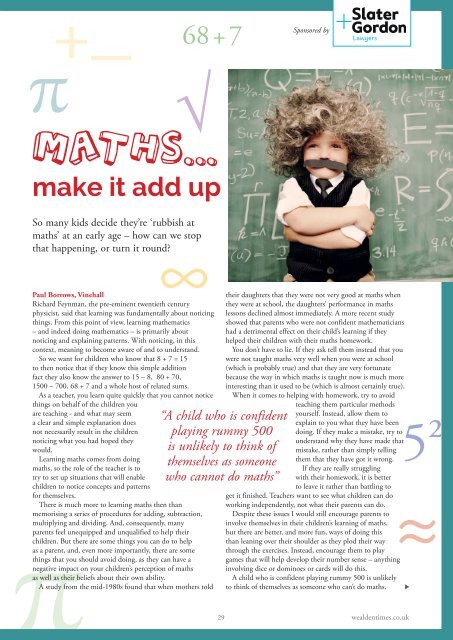Wealden Times | WT199 | September 2018 | Education supplement inside
Wealden Times - The lifestyle magazine for the Weald
Wealden Times - The lifestyle magazine for the Weald
You also want an ePaper? Increase the reach of your titles
YUMPU automatically turns print PDFs into web optimized ePapers that Google loves.
Sponsored by<br />
Maths…<br />
make it add up<br />
So many kids decide they’re ‘rubbish at<br />
maths’ at an early age – how can we stop<br />
that happening, or turn it round?<br />
Paul Borrows, Vinehall<br />
Richard Feynman, the pre-eminent twentieth century<br />
physicist, said that learning was fundamentally about noticing<br />
things. From this point of view, learning mathematics<br />
– and indeed doing mathematics – is primarily about<br />
noticing and explaining patterns. With noticing, in this<br />
context, meaning to become aware of and to understand.<br />
So we want for children who know that 8 + 7 = 15<br />
to then notice that if they know this simple addition<br />
fact they also know the answer to 15 – 8, 80 + 70,<br />
1500 – 700, 68 + 7 and a whole host of related sums.<br />
As a teacher, you learn quite quickly that you cannot notice<br />
things on behalf of the children you<br />
are teaching - and what may seem<br />
a clear and simple explanation does<br />
not necessarily result in the children<br />
noticing what you had hoped they<br />
would.<br />
Learning maths comes from doing<br />
maths, so the role of the teacher is to<br />
try to set up situations that will enable<br />
children to notice concepts and patterns<br />
for themselves.<br />
There is much more to learning maths then than<br />
memorising a series of procedures for adding, subtraction,<br />
multiplying and dividing. And, consequently, many<br />
parents feel unequipped and unqualified to help their<br />
children. But there are some things you can do to help<br />
as a parent, and, even more importantly, there are some<br />
things that you should avoid doing, as they can have a<br />
negative impact on your children’s perception of maths<br />
as well as their beliefs about their own ability.<br />
A study from the mid-1980s found that when mothers told<br />
“A child who is confident<br />
playing rummy 500<br />
is unlikely to think of<br />
themselves as someone<br />
who cannot do maths”<br />
their daughters that they were not very good at maths when<br />
they were at school, the daughters’ performance in maths<br />
lessons declined almost immediately. A more recent study<br />
showed that parents who were not confident mathematicians<br />
had a detrimental effect on their child’s learning if they<br />
helped their children with their maths homework.<br />
You don’t have to lie. If they ask tell them instead that you<br />
were not taught maths very well when you were at school<br />
(which is probably true) and that they are very fortunate<br />
because the way in which maths is taught now is much more<br />
interesting than it used to be (which is almost certainly true).<br />
When it comes to helping with homework, try to avoid<br />
teaching them particular methods<br />
yourself. Instead, allow them to<br />
explain to you what they have been<br />
doing. If they make a mistake, try to<br />
understand why they have made that<br />
mistake, rather than simply telling<br />
them that they have got it wrong.<br />
If they are really struggling<br />
with their homework, it is better<br />
to leave it rather than battling to<br />
get it finished. Teachers want to see what children can do<br />
working independently, not what their parents can do.<br />
Despite these issues I would still encourage parents to<br />
involve themselves in their children’s learning of maths,<br />
but there are better, and more fun, ways of doing this<br />
than leaning over their shoulder as they plod their way<br />
through the exercises. Instead, encourage them to play<br />
games that will help develop their number sense – anything<br />
involving dice or dominoes or cards will do this.<br />
A child who is confident playing rummy 500 is unlikely<br />
to think of themselves as someone who can’t do maths.<br />
<br />
29 wealdentimes.co.uk


















